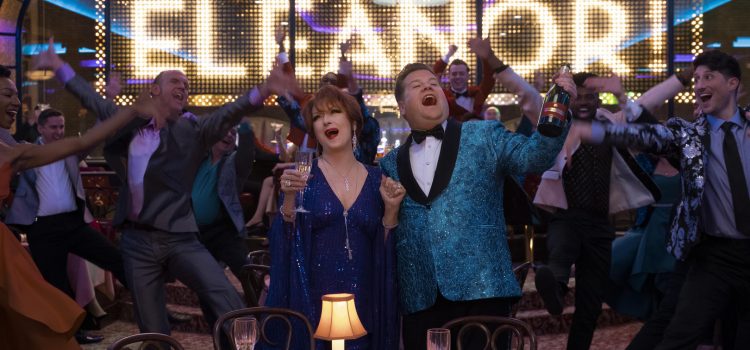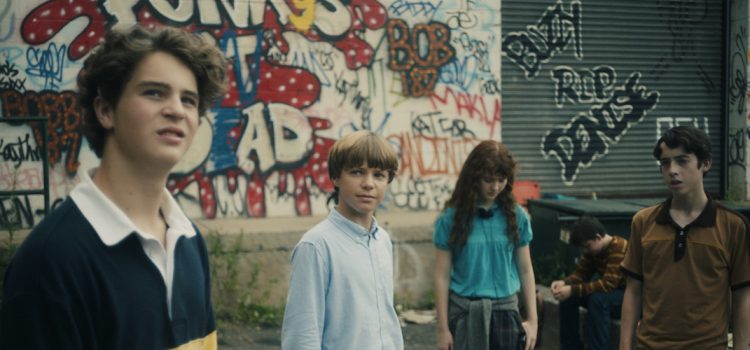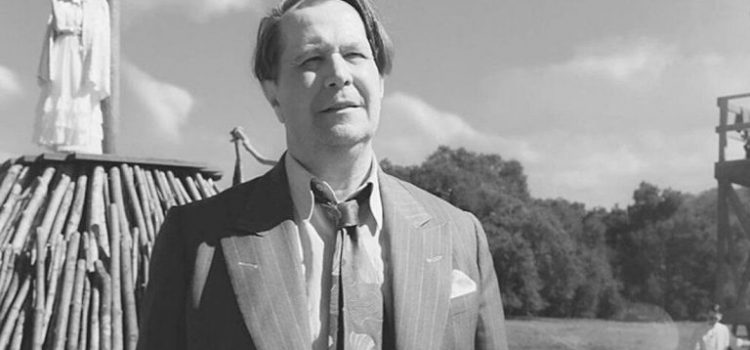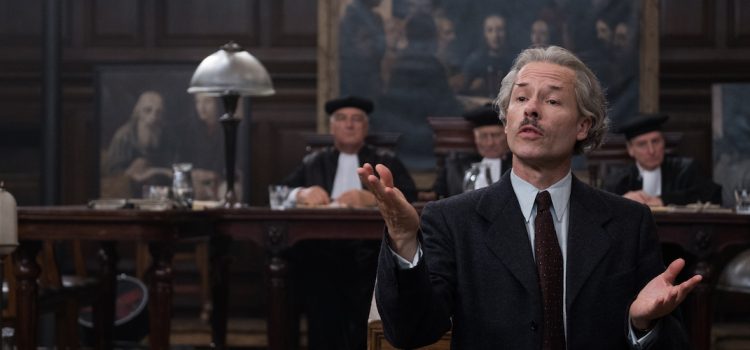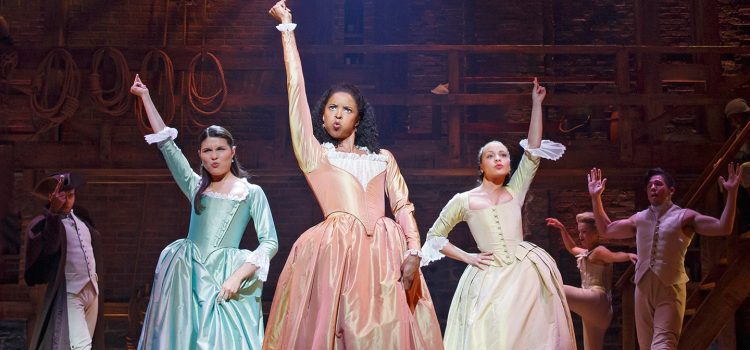By Lynn Venhaus
Adapted from the 2018 splashy big-hearted Broadway musical, “The Prom” pops with color and pizzazz (or, in the show’s parlance, “Zazz.”).
Vain Broadway stars Dee Dee Allen (Meryl Streep) and Barry Glickman (James Corden) are slammed for their flop, “Eleanor!: The Eleanor Roosevelt Story.” With their careers suddenly flatlined, their chorus dancer pal Angie (Nicole Kidman) finds a cause they can get behind – in small-town Indiana, high school student Emma Nolan (Jo Ellen Pellman) wanted to go with her girlfriend Alyssa (Ariana DeBose) to the prom, so the PTA cancelled it. The insufferable divas race to the rescue in conservative Edgewater, along with Trent (Andrew Rannells) and Angie. Their involvement isn’t that helpful but gets people to see Emma for who she is and that’s OK.
Its potent message on tolerance and inclusivity is still intact, but the framing has lost some of its sincerity as director Ryan Murphy has stretched it into a bigger and flashier cinematic canvas.
The musical is based on concept by Jack Viertel, who had read about a teen lesbian denied attending her prom in Mississippi in 2010, which involved the ACLU and a decision on violating the First Amendment. It also was a magnet for celebrity activism, which gets a lot of dings in “The Prom.”
Murphy, who created and helmed six seasons of “Glee,” has ramped up the glitz and gone over-the-top at every opportunity. He knows his way around a show tune and aims for the heart. However, he pulls focus on his big-name stars so that the same-sex couple gets less attention.
Nevertheless, newcomer Jo Ellen Pellman is wonderful as Emma, who grows in confidence. Ariana DeBose, a veteran of “Hamilton” who will star as Anita in the upcoming remake of “West Side Story,” is a sensational talent and plays the closeted cheerleader.
Streep, at age 71, pulls off a self-centered star in the manner of Patti LuPone, and looks like she’s having a blast with Nicole Kidman, James Corden and Andrew Rannells. While they are fine, their lesser marquee counterparts were superior in the Broadway roles – Tony-nominated Beth Leavel as Dee Dee and Brooks Ashmanskas as Barry especially. Kidman shows off her abilities in a Fosse number, “Zazz,” only Murphy has chosen not to highlight the iconic total body moves. Hmmm….
Some of the characters are exaggerated in such a way to render them superficial on film while on Broadway they were played by seasoned pros who sustained the campy fun the whole two acts. And maybe it’s because some of the original Broadway cast were Muny veterans, so their familiarity sold the warmth and joy.
I dearly loved the Broadway musical, nominated for seven Tony Awards and winner of the 2019 Drama Desk Award for Best Musical, which was produced by Stages St. Louis’ Jack Lane and other local theater people. Zippy and full of fizzy fun, “The Prom” had us laughing at the big-city elites, inside-showbiz jokes and mocking hicks in the sticks, but not in a mean way.
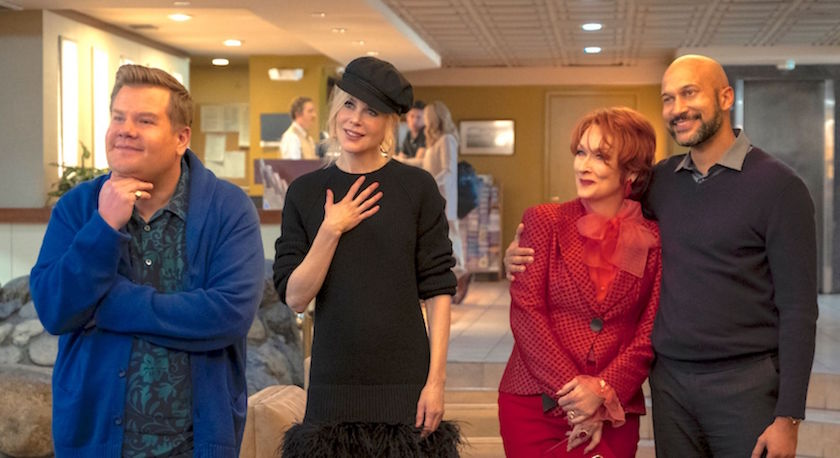
Only here the small town doesn’t look like a podunk village, but rather a larger city because it has a mall and a motel in the manner of a Hampton Inn.
For the original musical, Chad Beguelin of Centralia, Ill., nominated for six Tonys, wrote the lyrics and co-wrote the book with Bob Martin. Matthew Sklar wrote the music. Beguelin and Sklar, who did fun musical adaptations of “The Wedding Singer” and “Elf,” have a flair for writing hummable tunes with clever turns of phrase. “It’s Time to Dance” is a delightful number and “Unruly Heart” has the endearing sweetness for Emma to gain acceptance with a wider audience.
Andrew Rannells gets to shine – and dance through a shopping mall – in “Love Thy Neighbor,” a teachable moment to the town’s judgy teens.
Casey Nicholaw, who directed the stage show, did the choreography, and it’s as peppy and fun for the big movie ensemble as it was for the intimate cast at the Longacre Theatre. St. Louis native Jack Sippel, a Muny and Broadway veteran, was the film assistant choreographer/dance captain.
Costume designer Lou Eyrich never met a sequin he didn’t like and the flamboyant production design by Jamie Walker McCall has combined mid-century modern with bright lights.
The movie is padded, at 2 hours and 10 minutes, which doesn’t help the momentum. However, the exuberance of the work is the takeaway, and fortunately, the show will be on a national tour next year, spreading its cheerful message about acceptance.
It’s at local theatres but debuts on Netflix Dec. 11. To find out more about how you can support the Actors’ Fund and Broadway Cares, please visit BroadwayCares.org/TheProm.
“The Prom” is a musical comedy that runs 2 hours, 11 minutes. Directed by Ryan Murphy, it stars Meryl Streep, James Corden, Nicole Kidman, Andrew Rannells, Jo Ellen Pellman, Ariana DeBose, Kevin Chamberlin, Keegan Michael-Key, Sherry Washington and Mary Kay Place. It is rated PG-13 for thematic elements, some suggestive/sexual references and language. On Netflix.

